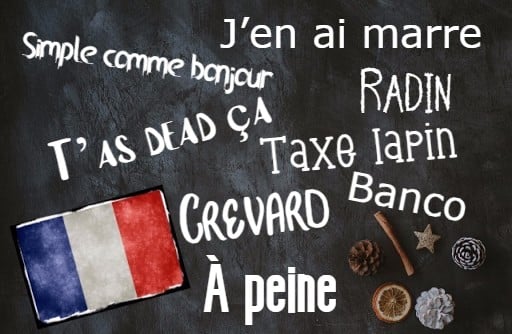Every weekday The Local publishes a French word or phrase of the day. We try to focus on colloquialisms, slang, sayings (and a bit of swearing) – you know, the type of French you won’t learn in the classroom, but will hear all the time in the street.
This daily habit means we have a very extensive back catalogue – find it here – and we’ve picked out eight of our recent favourites.
Taxe lapin
The literal translation of une taxe lapin – oon-tax la-pahn – is exactly what you would expect – ‘rabbit tax’.
However, this is not a tax on rabbits, or even on rabbit owners. It is in fact a ‘no-show fee’ or charge levied on people who make appointments and don’t turn up.
Fortunately, we showed up with an explanation, here.
Banco
Banco – bain-koh – is essentially the French word for “bingo!”. It might be colloquial, but politicians have been known to use it when indicating that something someone else has said is correct.
There’s more, right here.
Radin
Radin – rah-dahn – is a less-than complimentary French term for a penny-pincher, someone who is or ‘miserly’ with their money.
We, however, are not in the least stingy with our definition.
Crevard
Speaking of words that definitely aren’t complimentary… Crevard – creh-varr – is a colloquial term that can be used to describe someone who looks ill or exhausted. It’s roughly equivalent to telling someone that they ‘look like death warmed up’.
Find out more, here.
À peine
À peine – ah pen – means ‘with or to pain’ or ‘with or to effort’, and therefore makes no sense in English. But in French conversation, it acts as an adverb meaning ‘hardly’, ‘barely’ or ‘scarcely’.
We make sense of it all, here.
T’as dead ça
T’as dead ça – tah dead sah – combines the French verb avoir (to have) with the English word ‘dead’. And it’s a good thing, apparently. Because it refers to ‘killing it’ in the positive sense. If you tell someone t’as dead ça, it’s congratulatory, like ‘great job, you killed it!’
Simple comme bonjour
Simple comme bonjour – sahm-pluh com bohn-jor – translates as ‘simple as hello’.
It describes something that is very easy or quick, the French equivalent to ‘easy as ABC’, or ‘a piece of cake’.
Our explainer is just as straightforward, too.
J’en ai marre
J’en ai marre – roughly pronounced Johnny Marr – means ‘I’m fed up’.
We discuss this charming phrase in more depth here.



 Please whitelist us to continue reading.
Please whitelist us to continue reading.
Member comments